A strange phenomenon, which has been noticed before in a couple of studies in the USA, is that people (well, students) tend to behave more nicely if you surreptitiously prime their minds with religious thoughts. When you get an unexpected result like that, the worry is that it’s just a chance finding.
It’s a common concern in the study of the psychology of religion (and science in general), because so few findings are replicated by other researchers. That’s why a new study, by Ali Ahmed at Linnaeus University and Osvaldo Salas at the University of Gothenburg (both in Sweden) is particularly interesting.
They tested 224 students at Pontificia Universidad Católica de Valparaíso in Chile (yes, Chile, not Sweden – don’t ask me!), using two of the favourite laboratory tests of ‘niceness’ – the Dictator Game and the Prisoner’s Dilemma. The Dictator Game simply gives the participant some money, and offers them the chance to donate as much as they want to another, anonymous player. The Prisoner’s Dilemma asks you to either co-operate or default on another anonymous player.
Basically, the Dictator Game is a measure of how altruistic you are (and your sense of fairness), while the Prisoner’s Dilemma is a measure of how co-operative you think other people are.
The students were primed in a classic way – they were given a jumble of words, and had to form them into sentences (there’s more details of this at the foot of the post). Half the students got sentences with a religious theme. As you can see, the students who got the religious prime tended to be more generous and co-operative – regardless of whether or not they thought of themselves as religious.
There was no difference between the religious and non-religious students, either in the primed or non-primed state. What mattered was not whether they were religious, but whether they had been primed with religious thoughts. (In the Prisoner’s Dilemma game, the non-religious were a bit less co-operative overall, but this was not statistically significant).
This basically backs up results seen in students in the USA, which suggests that it;s not a purely chance or cultural effect. Of course, the big question is why it happens. Ahmed and Salas offer up three possibilities:
- Reminding people of god makes them feel like they’re being watched. For this to be true, the non-religious must have some kind of gut instinct that there is a god (due to their upbringing or their biology), regardless of their conscious beliefs.
- Religious prompts are just one example of a more general type of ‘pro-social’ prompt. For example, playing a similar trick but using words like ‘law’ and ‘judge’ or even ‘honesty’ has similar effects. People brought up in a religious tradition may continue to associate religious words with honesty, even if they are no-longer believers.
- Students are easily lead. These sorts of studies are usually done in students (because they’re easily obtained), but the one study that was done in free-range people did not see an effect of religious primes in non-religious adults. Perhaps young minds are just more malleable – in particular, they may still be making their minds up about religion.
So, basically, we need some more studies to sort this one out – in older people, and with non-religious ‘prosocial’ primes as a control!
 Edit: here’s a grab of the task they had to do to give them the religious prompt (click for a larger version). Half of them got a mix of 5 religious sentences (like in the table) and 5 non-religious ones. The other half got all non-religious ones. (e.g. they had to unscramble “food tasty cinema was the” (answer: “the food was tasty” – eliminate “cinema.”).
Edit: here’s a grab of the task they had to do to give them the religious prompt (click for a larger version). Half of them got a mix of 5 religious sentences (like in the table) and 5 non-religious ones. The other half got all non-religious ones. (e.g. they had to unscramble “food tasty cinema was the” (answer: “the food was tasty” – eliminate “cinema.”).
![]()
Ahmed, A., & Salas, O. (2011). Implicit influences of Christian religious representations on dictator and prisoner’s dilemma game decisions Journal of Socio-Economics, 40 (3), 242-246 DOI: 10.1016/j.socec.2010.12.013
 This article by Tom Rees was first published on Epiphenom. It is licensed under Creative Commons.
This article by Tom Rees was first published on Epiphenom. It is licensed under Creative Commons.















